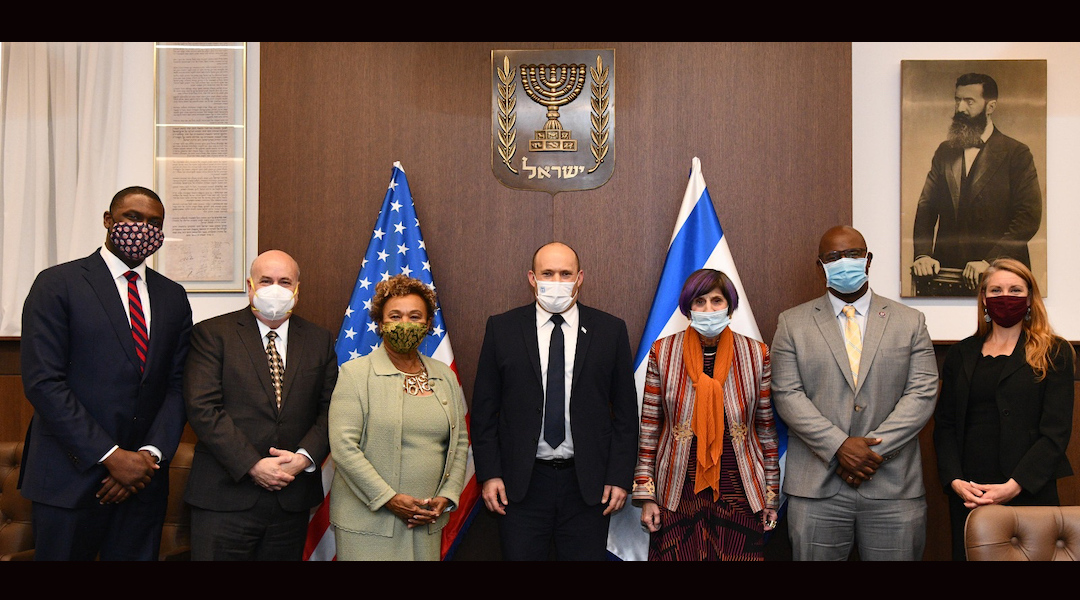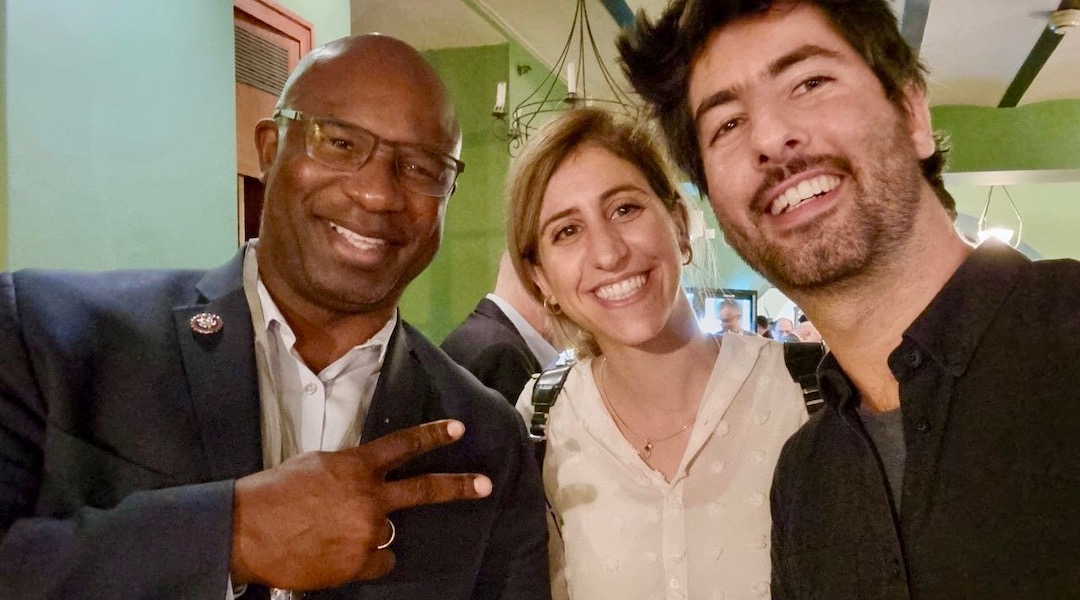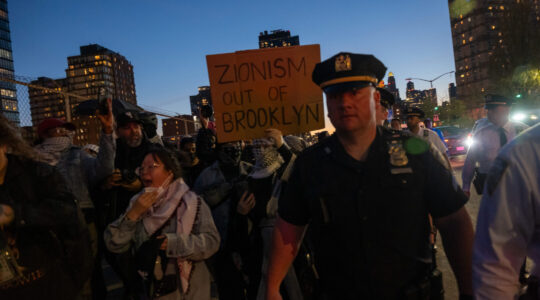(New York Jewish Week via JTA) — Speaking to a group of college students, Rep. Jamaal Bowman expressed no regret about taking a recent trip to Israel and the West Bank with the liberal pro-Israel group J Street, despite intense backlash from his socialist allies.
He did, however, have harsh words for Israel’s government.
“I left less optimistic about a two-state solution because of the reality on the ground,” he said in the question-and-answer session Monday. “Of course, I still believe in it and working toward making it happen but I think the U.S. has to make some very bold moves that don’t even have to be related to threats, in my opinion.”
Bowman, the first-term Democratic member of Congress from the Bronx and Westchester, took part in a congressional delegation earlier this month to Israel and the Palestinian areas of the West Bank. The delegation visited Israel and met with leaders there, including Prime Minister Naftali Bennett, and also saw Hebron and other Palestinian areas. The delegation asked to visit Gaza but, according to Bowman, was denied for security reasons by Israel and the United States.
Bowman’s participation in the trip was notable because he is a member of the Democratic Socialists of America, which supports a boycott of Israel. He is also a member of the “Squad,” the group of progressive Congress members including Reps. Ilhan Omar, Rashida Tlaib and Cori Bush, who have likewise endorsed the boycott movement.
Last year, Bowman unseated longtime Rep. Eliot Engel, a pro-Israel stalwart in his district, which includes the heavily Jewish Bronx neighborhood of Riverdale and other Jewish communities in Westchester. He has angered pro-Israel activists with some of his votes, including one to place conditions on how aid to Israel is used — though he recently voted for supplemental funding for Israel’s Iron Dome missile defense system.
In the weeks since the trip, he’s felt heat from the other side of the political spectrum. Groups within the DSA have called to expel Bowman from the movement for not heeding the boycott, and he met with DSA leadership more than a week ago regarding those complaints. Others voices in the group have spoken up in his defense, arguing that his expulsion would be counterproductive.
But in the Zoom call Monday night with dozens of college students from J Street U, the lobby’s campus arm, Bowman did not mention the DSA once and gave full-throated praise to the trip and the liberal Zionist group that led it. He called J Street “incredible” and said it was “on the right track” because it has opponents to its right and left.
(In the middle of the J Street U meeting, the DSA’s working group on Palestine called on the DSA “to formally begin the process of expelling Jamaal Bowman.”)
“When I told people I was going with J Street, people on the right of J Street were critical,” he said at the meeting. “And then people on the far left were also critical, like, ‘Oh, you know, they’re a Zionist organization. You shouldn’t go with them.'”
But Bowman said that he’d want to return to Israel and the West Bank, telling the students that “I have to go back three or four times to gather even more.”

Rep. Jamaal Bowman, second from right, met with Israeli Prime Minister Naftali Bennett, center, during his recent trip to Israel with a Congressional delegation led by J Street. (Haim Zach/Israeli Government Press Office)
Throughout the call, he was critical of Israel’s government and its approach to the West Bank. He cited Israeli suffering from terrorism and violence from Hamas, which governs Gaza, but said that was no excuse for Israel to continue its occupation of Palestinian territory. He noted that Israel’s foreign minister, Yair Lapid, supports the establishment of a Palestinian state alongside Israel but felt Lapid’s commitment to that policy was not “firm.”
He also said that he felt the Israeli government displayed “arrogance” toward American Jews who oppose the occupation.
“The two-state solution has become a talking point,” he said. “In my opinion, there’s no real policy or political movement in that direction.”
He added multiple times that he didn’t feel that Israelis acknowledge the experience of Palestinians, including the Nakba, the word meaning “catastrophe” that Palestinians use to refer to Israel’s creation, when many Palestinians were expelled from Israel or fled and were prevented from returning.
“While we use it here as a talking point, the current Israeli leadership, Naftali Bennett, was not for a two-state solution,” Bowman said. “There didn’t seem to be any appetite for it there, and there also didn’t seem to be any appetite, or any real acknowledgement of Palestinian pain, the Nakba or anything else. It wasn’t really talked about.”
Bowman said that it’s “obvious” and “absolutely true” that Israel has a right to defend itself. He praised Israeli groups that oppose the occupation, such as Breaking the Silence, a group of Israeli combat veterans that gave the delegation a tour of the West Bank city of Hebron.
“Working with Israeli activists on the ground is really, really important because I’m telling you, I felt it,” he said. “There was this, ‘Y’all aren’t over here, y’all in America, y’all can’t tell us what to do’ kind of vibe coming from some of the leaders that we met with.”
Bowman also said he hopes the Jewish community “continues to lead on this issue.” He discussed his visit to Yad Vashem, Israel’s Holocaust museum, and condemned antisemitism. But he said that his criticism of Israel was not antisemitic, and he dismissed opposition from some of his Jewish constituents on that account.
Criticizing Israel, he said, “definitely will upset more right-wing Jews in this district, it just will, because sometimes they don’t want any kind of criticism,” he said. “It’s a critique of the Israeli government. It’s not a critique of you because you’re Jewish. That has nothing to do with it.”
The New York Jewish Week brings you the stories behind the headlines, keeping you connected to Jewish life in New York. Help sustain the reporting you trust by donating today.





